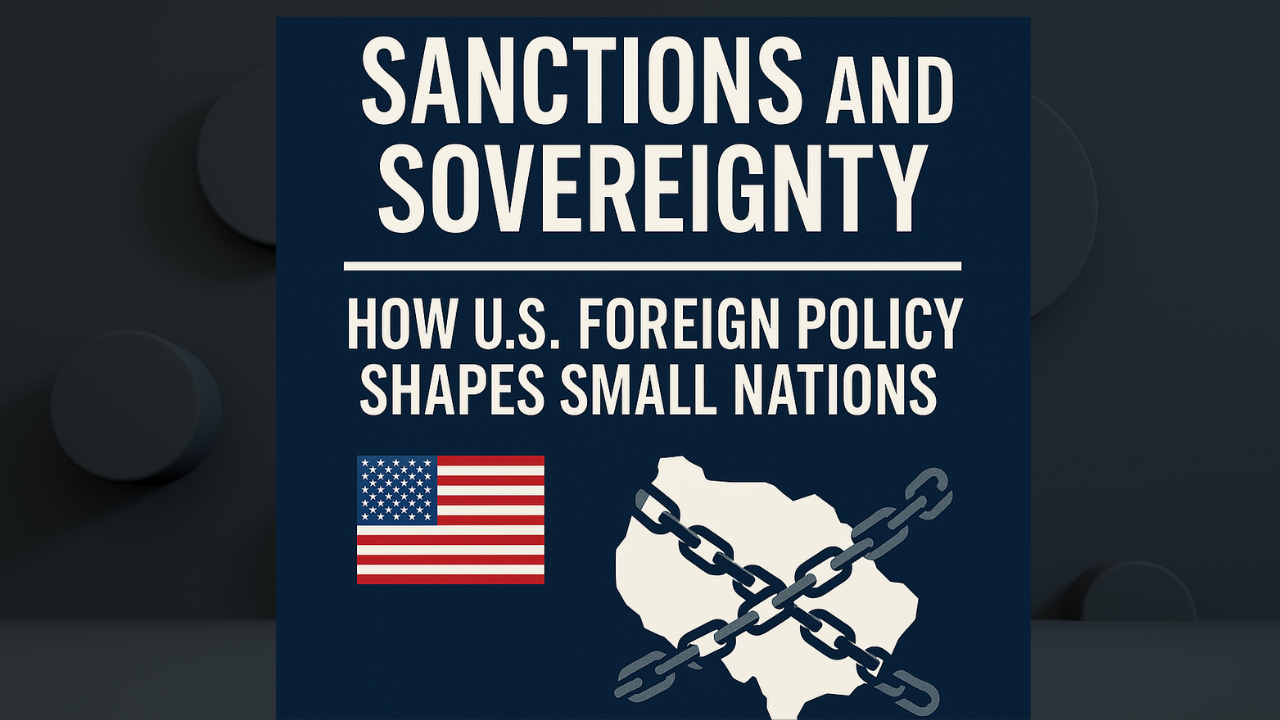Sanctions and Sovereignty: How U.S. Foreign Policy Shapes Small Nations
In today’s multipolar world, small nations face the challenge of navigating pressures from major powers. Among the tools the United States most frequently employs is the economic sanction: a non-military mechanism intended to punish authoritarian regimes, deter aggression, and promote human rights.
Sanctions are often framed as a humane alternative to war. Yet their mixed record raises key questions: Do sanctions foster reform, or do they worsen suffering and undermine sovereignty? This brief examines both.
Sanctions as a Double-Edged Sword
Sanctions work by restricting trade, banking, and financial flows to pressure elites and governments. However, their effects rarely fall neatly on the intended targets.
Intended benefit: Provide leverage without military intervention, publicly punish “bad actors.”
Risks: Collateral damage to civilians, weakened development infrastructure, and unintended political consequences such as strengthening authoritarian regimes.
Case Studies: Divergent Outcomes
Failures and Humanitarian Harm
Yugoslavia (1990s): UN and Western sanctions, meant to curb ethnic violence, devastated the economy (GDP collapsed, hyperinflation peaked at historic levels). Civilian suffering was enormous, while political elites entrenched themselves.
Iran and Cuba: Despite medical exemptions, both countries experienced shortages of essential medicine post-2018. Scholars argue financial restrictions made humanitarian trade unworkable in practice.
Venezuela: U.S. sanctions on oil and gold revenue constricted fiscal capacity but also deepened the humanitarian emergency, accelerating poverty and mass migration.
Somalia: Long-running sanctions aggravated famine and insecurity, punishing civilians more than warlords.
Niger (2023 coup): ECOWAS and Western responses cut electricity supplies and raised food prices, risking humanitarian crises disproportionate to their political aims.
Partial or Notable Successes
South Africa (1980s apartheid): Coordinated sanctions, coupled with grassroots activism, helped push Pretoria toward negotiations and eventual reform.
Libya (1990s–2003): Sanctions combined with diplomacy persuaded Muammar Qaddafi to abandon WMD programs.
North Korea (partial containment): While complete denuclearization has not happened, sanctions have slowed weapons financing and constrained luxury imports for elites.
Strategic Rationale from U.S. Policymakers
Why do Washington and its allies favor sanctions? Several reasons underlie their appeal:
Cost-effectiveness: Far cheaper and politically less risky domestically than military intervention.
Symbolism: Signals commitment to human rights and democracy.
Flexibility: Can be escalated, adjusted, or reversed more quickly than kinetic options.
Coordination leverage: Provides focal points for building coalitions (though this depends heavily on allied compliance).
Complications and Miscalculations
Entrenching Authoritarianism: Leaders under sanctions often redirect anger onto “foreign enemies,” boosting regime cohesion (e.g., Myanmar junta’s pivot to China and Russia).
Circumvention Mechanisms: Smuggling, use of cryptocurrency, barter trade, and gray markets blunt sanctions’ effectiveness while fueling corruption.
Secondary Sanctions Impact: U.S. pressure often punishes allied firms (e.g., European companies forced out of Iran due to U.S. penalties), straining alliances.
Human Rights Trade-offs: Research suggests sanctioned regimes frequently crack down harder domestically, worsening repression.
Wider Repercussions: Global and Domestic Costs
For Target Nations: Declines in GDP, soaring poverty, disrupted humanitarian aid channels, eroded social trust.
For the U.S.: Lost trade opportunities (estimates suggest $15–19 billion annually). Sanction fatigue may erode credibility as other powers (notably China and Russia) step in to fill the gap.
For Global Order: Growing perception of sanctions overuse risks fragmenting financial systems as rival blocs build “sanction-proof” alternatives.
Policy Implications: Rethinking Sanctions
Multilateralism over Unilateralism
Sanctions enforced by broad coalitions (e.g., UN, EU) tend to be more effective and legitimate.
Precision Targeting and Humanitarian Safeguards
Clear exemptions for medicine, food, and humanitarian aid must be enforced—not merely written into laws.
Regular, Independent Impact Audits
Sanctions should include built-in review mechanisms to measure humanitarian consequences and effectiveness.
Linkage to Diplomacy
Sanctions work best when tied to credible diplomatic off-ramps, not endless punishment without exit strategies.
Smart Relief Mechanisms
Offering sanctions relief as a reward for verifiable reforms keeps pressure constructive rather than purely punitive.
Conclusion
Sanctions are neither a panacea nor an outright failure. Their track record reveals dual realities: they can hasten regime change and foster normative pressure, but they can just as easily devastate civilians, entrench authoritarian leaders, and erode trust in U.S. global leadership.
For smaller nations, sanctions often feel less like a scalpel and more like a blunt instrument eroding sovereignty. As global power becomes more multipolar, U.S. policymakers face a choice: continue relying on broad economic punishments—or craft sanctions that are smarter, multilateral, and humanitarian-se...
Ultimately, sanctions should be used sparingly, strategically, and always with a diplomatic pathway attached. Only then can they serve the goals of peace, stability, and the dignity of smaller nations.







